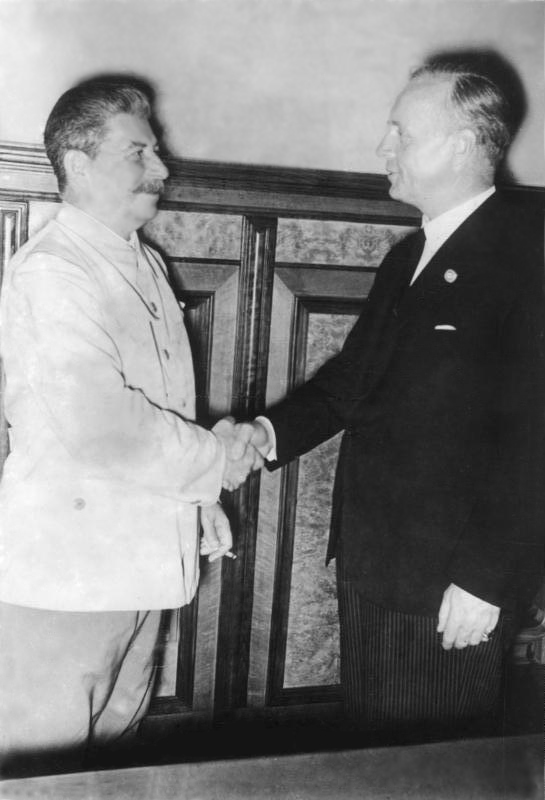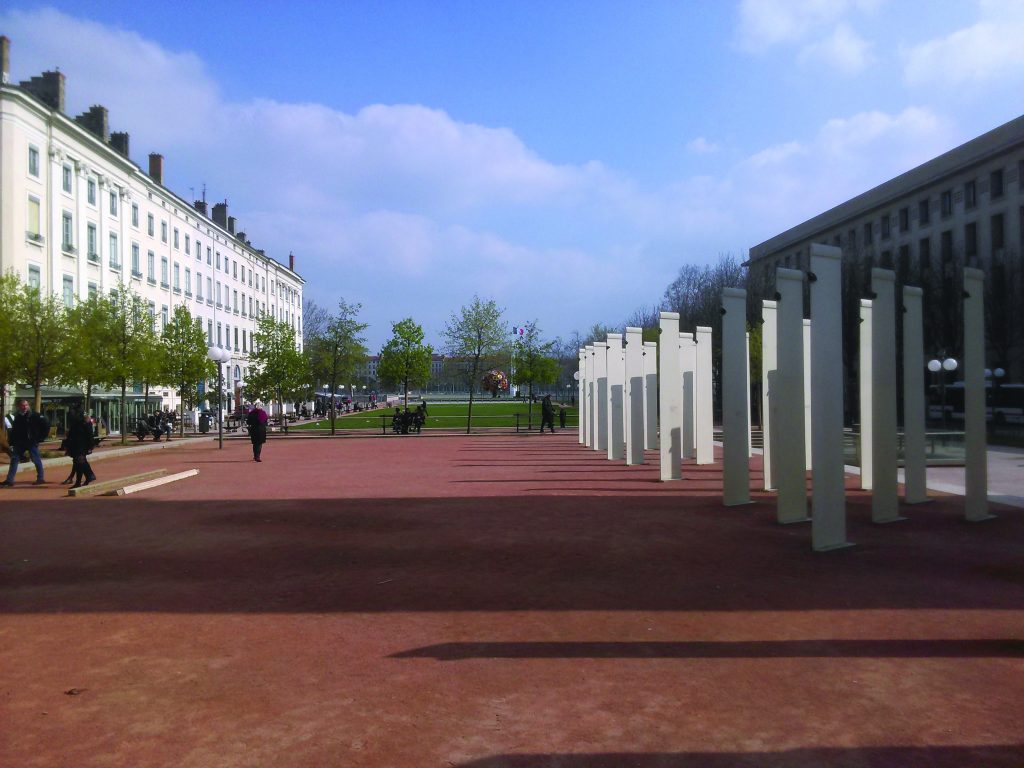Cover picture: Lyon Armenian Genocide Memorial was erected in 2006 in central Lyon, France. It was designed by Leonardo Basmadyian and includes 36 white concrete pieces supported by stones from Armenia. Poems of Kostan Zarian are written on the concrete pieces | EUROM
By Georges Mink, senior researcher emeritus at the Institut des Sciences Sociales du Politique (CNRS), tenured professor at the College of Europe (Natolin Campus) (1)
European Union countries have been developing new systems for managing conflictual pasts, and new uses of history and representations of historical memory have been manifesting themselves. Public policies for legally and normatively framing historical memory are multiplying across Europe. Policies originating from memory-driven issues and causes at a national level are often elevated to an international frame so as to amplify externalization benefits. In Poland, where the representation of the Second World War constitutes a major internal issue, embassies have even been instructed to file lawsuits against foreign media who, either by negligence or deliberately, speak of Polish concentration camps instead of German camps on Polish soil. “It is our duty to contradict myths that are harmful to Poland. If we do not, we Poles will leave ourselves open to future accusations of all kinds of misconduct without knowing the price [my italics] we will have to pay for them” (2).
But it is in France where this net of legal controls is tightest. Its internal and external effects are many. After the Gaysot Law of July 13, 1990, punishing denial of the Shoah (negationism), the French passed the memory law of January 29, 2001, recognizing the 1915 genocide of the Armenians by the Turks—a decision not without diplomatic consequences. The Taubira Law of the same year recognized slavery and the slave trade as a crime against humanity, opening up a new space for what may be called historicizing actions, including lawsuits, between France and its former colonies. Not to mention the majority decision of French (members of Parliament) MEPs to inscribe a mention of the beneficial—“civilizing”—effects of French colonialism (Law of February 25, 2005, Article 4). In response to this development, professional historians in France organized into more or less activist associations opposed to the abusive use of history and memory or in favor of free historical inquiry and opposed to state interference in academic study. The French also called upon the international history profession for support in the form of a petition drafted by a number of historians at a meeting at Sciences Po on December 10, 2005, in response to the lawsuit filed against French historian Olivier Pétré-Grenouilleau, who, in his book on the African slave trade, refused to call it genocide. This is the problem of the Taubira’s lawsuit which considered the slave trade of Africans by Europeans to be a crime against humanity and by this way have included the comparison with Shoah phenomena. For Olivier Pétré-Grenouilleau the slave trade did not qualify as a genocide since it did not have as its aim the destruction of slaves. Instead, slaves were seen and portrayed as economic goods represented merely in terms of commercial value. He insisted on demonstrating that the Shoah and slave trade were very different processes. A thousand historians signed the petition, which became the founding act of the Liberté pour l’histoire Association, presided over by René Rémond until his death and subsequently succeeded by Pierre Nora. As Nora explained it, the aim of amassing historian signatories, was to “recall that history is neither a religion or a type of morality; that it cannot be a slave to current events or be written as memory would dictate; that state policy is not history’s policy” (Pierre Nora and Françoise Chandernagor, Liberté pour l’histoire, Paris, CNRS Éditions, 2008, p. 7).

The internationalization of memory-driven causes goes hand in hand with an increase in the number of institutional arrangements for bringing about reconciliation and rapprochement, and at a more general level, with the development of a grammar of norms and rules for managing post-conflict situations. Arrangements and grammar cannot be dissociated from normative memory-driven issues and policies. Their number and the variety of situations they treat and solutions they propose are well known: for example, how to exit armed conflicts (former Yugoslavia, Northern Ireland), authoritarian and/or segregationist regimes (South Africa, Central America, southern Europe, central and Eastern Europe), or inherited bilateral conflicts (England/Ireland, Germany/Czech Republic, Germany/Poland, Poland/Ukraine, Italy/Slovenia, Greece/Turkey and others). A heterogeneous set of arrangements have been developed to handle these “painful pasts”. They range from Truth and Reconciliation Commissions, bilateral historian commissions, Institutes of Memory in post-communist countries, to professional peace-keeping activities and include specific museographic arrangements and interventions in international institutional arenas such as the Council of Europe, the OSCE and the EU. This institutional density is sometimes interpreted as proof that history and its memory-driven mediations have been dropped in favour of legal or administrative regulations outside the national framework (3). I would hypothesize instead that what we are seeing is in fact an intensification of partisan memory games in a context where those responsible for violence, in what were once firmly closed national frameworks, are increasingly likely to be called to legal account and criminalized as those frameworks break apart. It is not only in France that historians have felt the need to oppose state moves to define and manage history, though it is in France that they have organized massively in associations to defend the freedom to practice the profession of historian or to monitor political uses of history and memory. The need for such associations also became clear in another case when the Russian powers-that-be decided they could not leave Russian history to Russian historians, but instead had to keep a close eye on the country’s image abroad and counter any efforts to debase it themselves. In May 2009, in response to EU and Council of Europe initiatives to establish a kind of official symbolic equivalency between Stalinism (perhaps communism) and Nazism—the European Parliament had decreed August 23 the “European Day of Remembrance for Victims of Stalinism and Nazism”—then-President Dimitri Medvedev declared that history was an attribute of national “sovereignty”. Just before the seventieth anniversary of the German-Soviet Non-aggression Pact and the start of the Second World War, which the EU was preparing to commemorate, Medvedev declared, “You cannot call something black something that is white, you cannot accuse a defender of being an aggressor”. This remark was swiftly followed by the founding of the Presidential Commission of the Russian Federation to Counter Attempts to Falsify History to the Detriment of Russia’s Interests. A considerable number of Russian historians protested against the pressure they expected the new monitoring authority to exert under the pretense of “tracking down and countering erroneous interpretations of history abroad” and how it would officialise arbitrary political censorship. The fact is that in a growing number of societies the state intrudes massively in the field of history.

Stalin and Ribbentrop after the signature of the Soviet-Nazi German pact. August 23, 1939
Should states have the right to dictate laws on memory and interfere in the field of history?
Governing powers everywhere choose historical accounts and memory representations that work in their political favour; they have understood the electoral benefits they stand to gain from “using the dead to govern the living”. When the Law and Justice Party (PiS) was in power in Poland for the first time (2005-2007), its governments promoted the concept of “history policies” to justify state interventionism in the interpretation of historical facts—even in foreign countries. As I mentioned earlier, they threw out foreign press organizations who, either out of negligence or deliberately, spoke of Polish concentration camps instead of Nazi camps on Polish soil. In that particular case, Polish indignation is legitimate, but the implication of the Polish state opens a new and frightening perspective on history and memory games. The authorities export their version of national history into international arenas to obtain two types of gains: looking like a hyper-patriot at home compared to their political opponents, and consolidating their geopolitical status outside the country. The only reason these actions are undertaken is the implicit or explicit wager that they will reactivate an emotion-driven national community around a single memorial foundation, and so increase the electoral potential of those who impose norms of historical interpretation. All of this clearly undermines the autonomy of the science of history: judges, police, MPs, and diplomats have come to think of themselves as experts on history. Meanwhile, in some countries it is the historians themselves who saw off the branch they are sitting on: exceeding their professional prerogatives, using their scientific legitimacy for political ends. Some of the historians in central and eastern Europe with access to the institutions created to guard the archives of communism—commonly known as Institutes of National Memory—have organized leaks of files fabricated by communist police forces before 1989 to compromise their political adversaries, claiming that the former executioners and their accomplices are deliberately sabotaging “transitional justice”.

The fact that electoral strategies of “historicization” have been multiplying throughout the world makes it clear that we need to condemn abusive uses of history for political purposes at a much greater scale than the national one. Obviously, it is in no government’s interest to obey academic canons; governments are driven by hopes of political gain. The more a reference to history pays off politically, the more politicians will use it. In this context, laws on memory, which their authors say were formulated to protect historical “truth” or repair past injustices, produce unexpected, perverse effects: they threaten the freed exercise of the profession of historian, but above all they become a political weapon that takes the form of a monopoly on historical interpretation and hereby change the rules of democracy. Clearly, then, such laws create more problems than they resolve, opening the way—and a wide way it is—to instrumentalize historical facts and memorial representations of them. Meanwhile, the initial question remains unanswered: How can we simultaneously prevent negationism or purge a criminal past—two phenomena that must be regulated—while ensuring that the dead do not govern the living?
References
(1) Most recent work by Georges Mink: La Pologne au Coeur de l’Europe, de 1914 à nos jours, histoire politique et conflits de mémoire, Paris, Buchet Chastel, 2015; expanded translated version in Polish, Cracow, Wydawnictwo Literackie, 2017.
(2) Statement by the Polish MEP Wojciech Roszkowski quoted in “O potrzebie polskiej polityki historycznej” [On the need for Polish historical policy], in R. Kostra, T. Merta (eds.), Pamiec i odpowiedzialnosc [Memory and responsibility], Center for conservative political thinking, Cracow and Wroclaw, 2005, p. 125.
(3) See, for example, Alain Finkielkraut, “La nouvelle immortalité”, in A. Houziaux (ed.), La mémoire, pour quoi faire? Les Éditions de l’Atélier, 2006, pp. 105-111.
